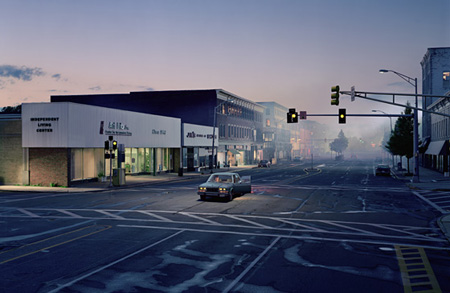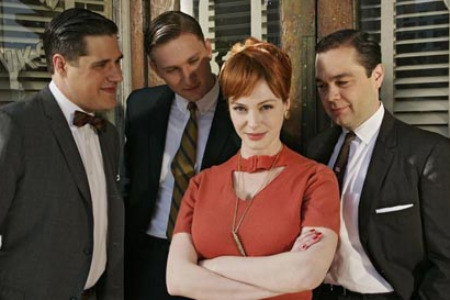
I interviewed photographer Gregory Crewdson for The Paris Review Daily, where we talked about the movies (Lynch, Hitchcock, Malick), the pursuit of things that are perfect, digital versus film, and Mad Men, of course. In the “good news” category: Wes Anderson is finally working at a quicker pace. Hooray!
Fun fact, I don’t know if this remains in the final piece: Mr. Crewdson watches Mad Men on his iPad, because it reminds him of looking through the ground glass on his 8 by 10 camera, which makes a lot of sense.
Dear Elisabeth Moss,
Hey! Cool job in Top of the Lake. It is wicked good and spooky and strange and entrancing, and I hope you find that missing girl. And I can’t wait to see you come to rule the advertising world as Peggy on Mad Men! (OMG, this Sunday!)
But “Lizzie,” can I call you that? By all reports people call you Lizzie. I gotta bone to pick with your IRL nickname. (Nice birthday cake, name traitor!) You see, the name Elisabeth-with-an-S is a beautiful name, common in Scandinavia and France, a translation of the Greek, which is a variation on the stodgy Biblical original (although where the Z came from, considering … ). It is nice having the name Elisabeth, but because the spelling difference is so minute - “Elisabeth” is ranked 604 in the US, “Elizabeth” is ranked 11th in lady baby naming, for example - I have become accustomed to people misspelling my name. It is so common and frequent an occurrence, that I do not even judge them for it! Rather, I am more surprised, and think more highly of someone if they take the care to spell my name correctly. (Rejections are invariably addressed to “Elizabeth Donnelly” and I’m like, who is that?)
But you’re ruining it for all Elisabeths, Elisabeth, if you go by “Lizzie.” You are our most famousest representative, ever since Elisabeth Shue disappeared! Technically, Liz and its permutations aren’t really a nickname for your name! And when people hear Lizzie, they think they can call all Elisabeths, Elizabeths, whatever, Liz with faux familiarity and that’s simply not the case, in fact, Liz is arguably … not your name! I came to this realization at the age of 17, where, during my senior year of high school, I campaigned to be called by my name, Elisabeth, and not the nickname Liz, which people had forced on me since I was a child; as the name Elisabeth is a four-syllable monster and naturally, humans want to say something that is snappy and quick, one mere syllable.
And I don’t want more people to default to lazy spelling and call me Elizabeth, I want them to take the time and call me Elisabeth, my name. I want people to write it correctly in emails. I make every tiny child I know these days suffer through calling me “auntie e-lis-a-beth” and it is spectacular.
So think about that, Lizzie, think about that. Stand tall and be an Elisabeth-with-an-s. Demand to have your name spelled right all the time. People may make fun of you, ala “Ann with an E” Hathaway, but I won’t. Nor will the generation of Elisabeths in the US who may get their name spelled correctly, for once.
As the Ting Tings said, “That’s Not My Name,"
LYLAS,
Elisabeth


